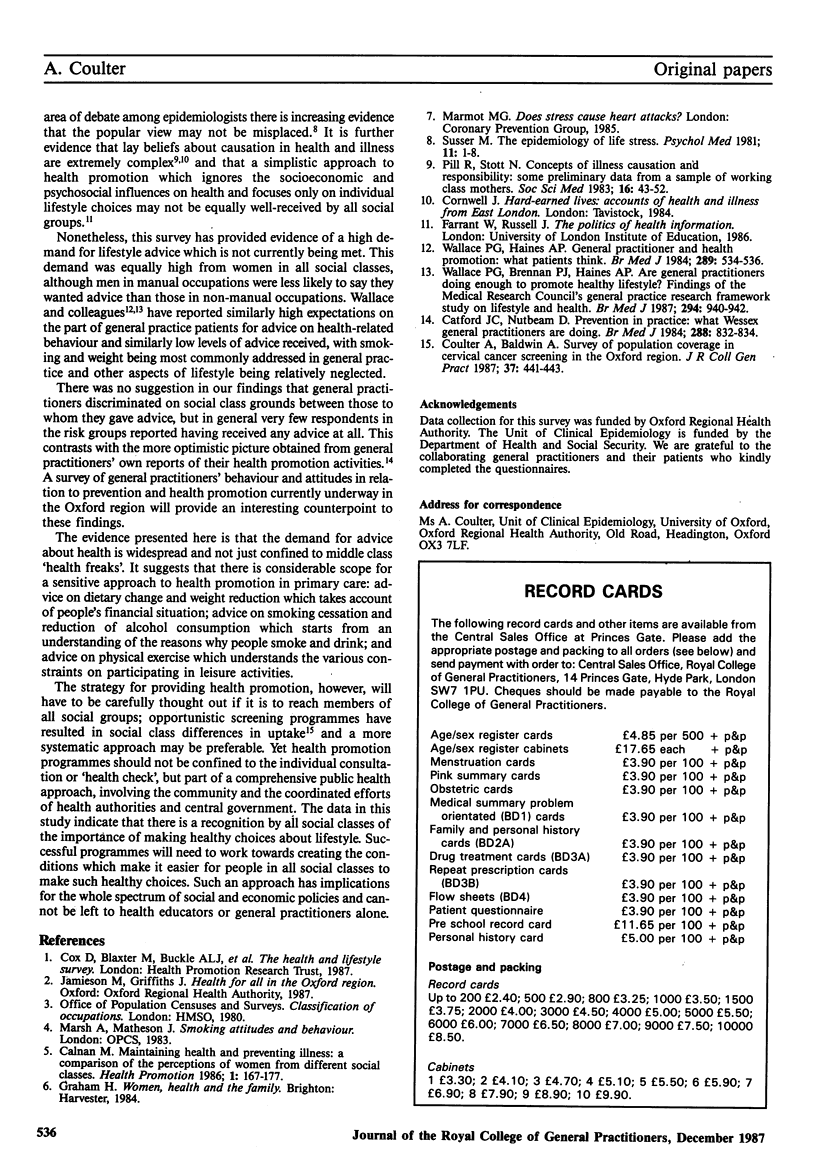Abstract
Data from the Oxford healthy life survey were used to explore social class variations in beliefs about the determinants of health, willingness to contemplate behaviour change and experience of lifestyle advice in primary care.
While the association between lifestyle factors and health was well-recognized by all social groups, those in social classes 1 and 2 were more likely than others to stress the importance of smoking, diet and exercise, while those in social classes 4 and 5 were more likely than middle class people to emphasize the effect of socioeconomic influences on health such as unemployment, income, pollution and housing. Members of all social classes attributed considerable importance to psychosocial influences on health. In all social classes a substantial proportion of overweight people expressed a desire to reduce their weight, smokers to modify their smoking habits and sedentary people to increase the amount of exercise they took. However, there was less interest in dietary change or reduction of alcohol consumption. One third of the smokers and of those who were overweight had received advice from health professionals about behaviour modification, but less than 10% of those in the other risk groups reported receiving advice. There was a high demand for advice on health; 44% of all respondents said they would be interested in receiving advice on a healthier lifestyle.
Full text
PDF



Images in this article
Selected References
These references are in PubMed. This may not be the complete list of references from this article.
- Catford J. C., Nutbeam D. Prevention in practice: what Wessex general practitioners are doing. Br Med J (Clin Res Ed) 1984 Mar 17;288(6420):832–834. doi: 10.1136/bmj.288.6420.832. [DOI] [PMC free article] [PubMed] [Google Scholar]
- Coulter A., Baldwin A. Survey of population coverage in cervical cancer screening in the Oxford region. J R Coll Gen Pract. 1987 Oct;37(303):441–443. [PMC free article] [PubMed] [Google Scholar]
- Pill R., Stott N. C. Concepts of illness causation and responsibility: some preliminary data from a sample of working class mothers. Soc Sci Med. 1982;16(1):43–52. doi: 10.1016/0277-9536(82)90422-1. [DOI] [PubMed] [Google Scholar]
- Susser M. The epidemiology of life stress. Psychol Med. 1981 Feb;11(1):1–8. doi: 10.1017/s0033291700053228. [DOI] [PubMed] [Google Scholar]
- Wallace P. G., Brennan P. J., Haines A. P. Are general practitioners doing enough to promote healthy lifestyle? Findings of the Medical Research Council's general practice research framework study on lifestyle and health. Br Med J (Clin Res Ed) 1987 Apr 11;294(6577):940–942. doi: 10.1136/bmj.294.6577.940. [DOI] [PMC free article] [PubMed] [Google Scholar]
- Wallace P. G., Haines A. P. General practitioner and health promotion: what patients think. Br Med J (Clin Res Ed) 1984 Sep 1;289(6444):534–536. doi: 10.1136/bmj.289.6444.534. [DOI] [PMC free article] [PubMed] [Google Scholar]



